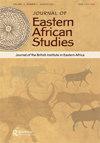Gimgema:埃塞俄比亚EPRDF公务员的评价、权力和意识形态
IF 0.6
3区 社会学
Q2 AREA STUDIES
引用次数: 2
摘要
摘要埃塞俄比亚人民革命民主阵线(EPRDF)在其28年的统治期间,建立了一个强大的控制埃塞俄比亚国家和民间社会的体系。这篇文章着眼于共产党最初是如何控制公务员队伍的。它分析了公务员评估的功能,称为gimgema。这种评估包括填写评估表和批评和自我批评会议,在这些会议期间,局的员工必须公开承认自己的错误并指责同事。同时也是党内官员的各局局长随后决定该员工的未来。文章描述了制度的运作、政治效率以及国家机构实施的一些抵抗策略。gimgema诞生于马列主义的意识形态框架中,是埃塞俄比亚对全球社会主义评价主题的变体,现在完全符合新自由主义对“善政”、“承诺”和“透明度”的禁令。作为EPRDF意识形态演变的象征,gigema体现了政府技术的意识形态不确定性。本文章由计算机程序翻译,如有差异,请以英文原文为准。
Gimgema: civil servants’ evaluation, power and ideology in EPRDF Ethiopia
ABSTRACT During its 28 years of rule, the Ethiopian Peoples’ Revolutionary Democratic Front (EPRDF) had built a strong system for controlling the Ethiopian state and civil society. This article looks at how the party first managed to keep control over the civil service. It analyses the functioning of civil servants’ evaluations called gimgema. Such evaluations comprise the filling of evaluation forms and sessions of criticisms and self-criticisms during which bureaus’ employees have to publicly acknowledge their mistakes and accuse colleagues. Bureau heads who are also party officials then decide on the employee’s future. The article describes the functioning of gimgema, its political efficiency, and some resistance strategies put in force by state agents. Born in a Marxist-Leninist ideological framework, gimgema is an Ethiopian variation on the global socialist evaluation theme, now fitting perfectly with neoliberal injunctions to ‘good governance’, ‘commitment’ and ‘transparency’. As a symbol of the EPRDF’s ideological evolution, gimgema exemplifies the ideological indeterminacy of government techniques.
求助全文
通过发布文献求助,成功后即可免费获取论文全文。
去求助
来源期刊

Journal of Eastern African Studies
AREA STUDIES-
CiteScore
3.30
自引率
7.10%
发文量
12
期刊介绍:
Journal of Eastern African Studies is an international publication of the British Institute in Eastern Africa, published four times each year. It aims to promote fresh scholarly enquiry on the region from within the humanities and the social sciences, and to encourage work that communicates across disciplinary boundaries. It seeks to foster inter-disciplinary analysis, strong comparative perspectives, and research employing the most significant theoretical or methodological approaches for the region.
 求助内容:
求助内容: 应助结果提醒方式:
应助结果提醒方式:


